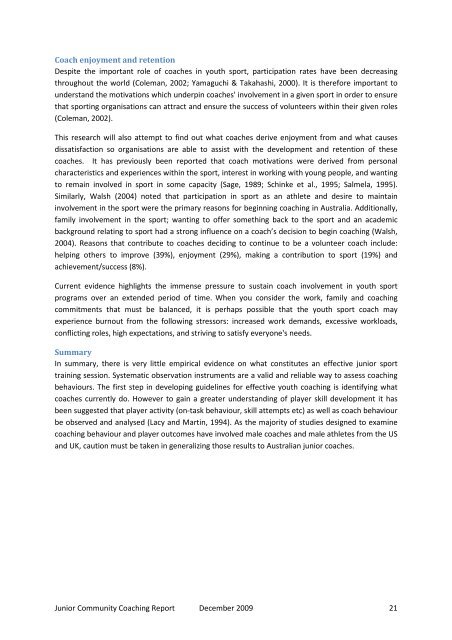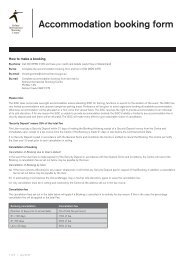Community Junior Sport Coaching final report - 2009
Community Junior Sport Coaching final report - 2009
Community Junior Sport Coaching final report - 2009
Create successful ePaper yourself
Turn your PDF publications into a flip-book with our unique Google optimized e-Paper software.
Coach enjoyment and retention<br />
Despite the important role of coaches in youth sport, participation rates have been decreasing<br />
throughout the world (Coleman, 2002; Yamaguchi & Takahashi, 2000). It is therefore important to<br />
understand the motivations which underpin coaches' involvement in a given sport in order to ensure<br />
that sporting organisations can attract and ensure the success of volunteers within their given roles<br />
(Coleman, 2002).<br />
This research will also attempt to find out what coaches derive enjoyment from and what causes<br />
dissatisfaction so organisations are able to assist with the development and retention of these<br />
coaches. It has previously been <strong>report</strong>ed that coach motivations were derived from personal<br />
characteristics and experiences within the sport, interest in working with young people, and wanting<br />
to remain involved in sport in some capacity (Sage, 1989; Schinke et al., 1995; Salmela, 1995).<br />
Similarly, Walsh (2004) noted that participation in sport as an athlete and desire to maintain<br />
involvement in the sport were the primary reasons for beginning coaching in Australia. Additionally,<br />
family involvement in the sport; wanting to offer something back to the sport and an academic<br />
background relating to sport had a strong influence on a coach’s decision to begin coaching (Walsh,<br />
2004). Reasons that contribute to coaches deciding to continue to be a volunteer coach include:<br />
helping others to improve (39%), enjoyment (29%), making a contribution to sport (19%) and<br />
achievement/success (8%).<br />
Current evidence highlights the immense pressure to sustain coach involvement in youth sport<br />
programs over an extended period of time. When you consider the work, family and coaching<br />
commitments that must be balanced, it is perhaps possible that the youth sport coach may<br />
experience burnout from the following stressors: increased work demands, excessive workloads,<br />
conflicting roles, high expectations, and striving to satisfy everyone's needs.<br />
Summary<br />
In summary, there is very little empirical evidence on what constitutes an effective junior sport<br />
training session. Systematic observation instruments are a valid and reliable way to assess coaching<br />
behaviours. The first step in developing guidelines for effective youth coaching is identifying what<br />
coaches currently do. However to gain a greater understanding of player skill development it has<br />
been suggested that player activity (on-task behaviour, skill attempts etc) as well as coach behaviour<br />
be observed and analysed (Lacy and Martin, 1994). As the majority of studies designed to examine<br />
coaching behaviour and player outcomes have involved male coaches and male athletes from the US<br />
and UK, caution must be taken in generalizing those results to Australian junior coaches.<br />
<strong>Junior</strong> <strong>Community</strong> <strong>Coaching</strong> Report December <strong>2009</strong> 21

















